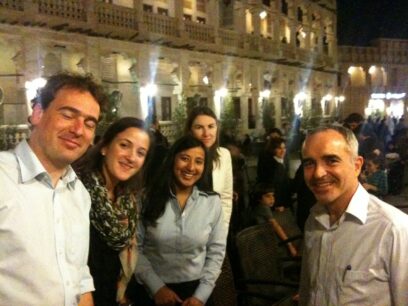By Paloma Haschke
9.30 – 11.00am
Doha International Center for Interfaith Dialogue (DICID)
The centre was created in 2008, as a result of the 5th annual Doha Interfaith Conference that took place a year earlier. Even though the center presents itself as an independent institution, it receives the totality of its funding from the state of Qatar.
The DICID focuses its efforts on the Abrahamic religions, Judaism, Christianism, and Islam, and therefore, when hosting or organizing conferences, it works with scholars of these three confessions. Representatives of other religions, Hindus or Buddhists for example, can attend DICID events but can’t be part of the speakers. Also, non-believers are not invited to participate to those interfaith events.
DICID events don’t talk about religious dogma in itself but rather address believers and try to bring them together by highlighting common points between the three monotheist religions.
The center is not directly reaching out to the mass. It gathers scholars and educated people and tries to change the bottom of society from its top to improve interreligious relationships. “We need to educate imams if we want to educate people” said our host Dr. Ibrahim Al Naimi, chairman of the center.
11.30am – 1.00pm
Al Jazeera Network
Al Jazeera Arabic has started to broadcast in the Arab world in 1996. In 2006, a year after launching of Al Jazeera English, the Emir of Qatar announced the creation of the Al Jazeera Network. Today it is composed by more than 15 channels, specialized in news, sports, children, or documentaries. The network also has centers dedicated to media training and research and development.
The channel sees its future online, with the realization of packages that would offer the viewers different supports of information. Al Jazeera Network is also working on broadcasting in Turkish, Swahili, and in Bosnian.
The English and the Arabic channels don’t have the same editorial guidelines. They share information and resources but don’t target the same audience. Therefore, they don’t organize their bulletins and news hours the same way. Also, if the two channels cover the same issues, they’re probably going to do it through different perspectives.
4.00 – 6.30pm
Fanar, Qatar Islamic Cultural Center
The center aims at teaching Qatari culture (Arabic language, Islam, cultural core values…) to foreigners to help them to understand how to behave in Qatar on a daily basis with the locals and with authorities.
Qatari identity is defined by being Arab, Muslim and most of the times Bedouin with a very close relationship to the desert and the ancient nomad way of life.
Most of the students of Fanar are neither Arab nor Muslim and the center tries to reach those minorities – that are actually majorities in Qatar – through their embassy, their community to help them to achieve a successful integration. At the center of this process there is the mosque and the Friday prayer “Salat Al Jumuah”. In this center the main preach, called Khutba, is done in English and Koran is available in ten different languages such as French, Swahili, Pilipino…
During preach, the Khatib usually chooses a topic and discusses it with the audience in the prayer room. Every topic can be addressed as long as it has something to do with Islam and the way to practice it. The center also tries to cover every aspect of Islam in its teachings, from the postures used for prayer to reading and studying Koran.
7.00 – 8.30pm
Visit of Souk Waqif



